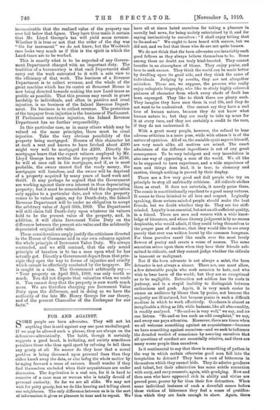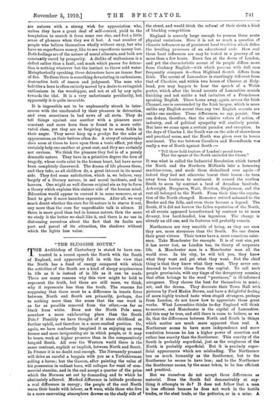FOR AND AGAINST.
SOME people are born advocates. They will not let anything that is said against any one pass unchallenged. If we may be allowed such a phrase, they are always on the defensive—altruistically. The habit, though it certainly suggests a good heart, is irritating, and society sometimes penalises those who thus spoil sport by refusing to tell them any gossip at all. No sooner do they hear that a moral problem is being discussed upon personal lines than they either knock away the data, or else befog the whole matter by bringing forward a mass of excuses. Small wonder if they find themselves excluded when their acquaintance are under discussion. The deprivation is a real one, for it is hard to conceive of a sane man or woman who is totally devoid of personal curiosity. So far we are all alike. We may not wish for petty gossip, but we do like hearing and telling about our neighbours. The only difference between us is in the sort of information it gives us pleasure to hear and to repeat. We have all at times hated ourselves for taking a pleasure in morally bad news, for being unduly entertained by it, and for saying instinctively to ourselves : "I shall enjoy telling that to So-and-so." We ought to have heard with sorrow, but we did not, and we feel that those who do are not quite human.
We do not think that the born advocates are invariably such good fellows as they always believe themselves to be. Some among them no doubt are truly kind-hearted. They cannot breathe in an atmosphere of blame. They enjoy praise, and love to seek excuse. They think the world can be made better by dwelling upon its good side, and they think the same of individuals. Judging by results, they are not altogether mistaken. These are, we suppose, the persons who really enjoy eulogistic biography, who like to study highly coloured pictures of character from which every shade of fault has been expunged. They like to think there are plenty such.
They imagine they have seen them in real life, and they do
not want to be undeceived. One cannot say they have a real love of human nature, because they do not know what human nature is; but they are ready to take up arms for it at every turn, and they are certainly a credit to the race, if they do not understand it.
With a great many people, however, the refusal to hear adverse criticism is a mere pose, while with others it is of the nature of cynicism. All of us, the amiable cynic says to himself, are very much alike, all motives are mixed. The exact admixture of the different ingredients is not of any great consequence. To be very indulgent and very incredulous is also one way of appearing a man of the world. We all like to be supposed to have experience, and a wide experience of men and things does lead, it is true, to clemency and caution, though nothing is proved by their display.
There are a few very good and dull people who try on principle to stop all unfriendly criticism. All ridicule strikes them as cruel. It does not entertain, it merely pains them.
The comic is constitutionally repellent to a good many natures. It seems to them inimical to all love and respect. Logically speaking, these serious-minded people should make the best friends, but we doubt whether they do. They are too stiff- minded. Loyalty is an essential, but not an all-sufficient quality, in a friend. There are men and women with a wide know- ledge of literature, and whose literary judgment is by no means despicable, who would admit, if they could bring themselves to the proper pass of candour, that they would like to see every
parody that ever was written burnt by the common hangman. For them parodies crawl like snails over the most lovely
flowers of poetry and create a sense of nausea. The same sensation seizes upon them when they hear their friends sub-, mitted to ridicule, and they cannot judge whether the ridicule is innocent or malignant.
But if the born advocate is not always a saint, the born detractor is not always a sinner. There are, one must allow, a few detestable people who seek occasion to hate, and who wish to hear harm of the world; but they are so exceptional as to be negligible. Detraction not seldom has its roots in jealousy, and in a stupid inability to distinguish between enthusiasm and gush. Again, it is very much easier to amuse an audience by blame than by praise, not because the majority are ill-natured, but because praise is such a difficult
medium in which to work effectively. Goodness is almost as inexplicable a thing as life, while badness, like all abnormality, is readily analysed. "So-and-so is very well," we say, and no one listens. "So-and-so has such an odd complaint," we say,, and every one pays attention. Moreover, there are times when we all welcome something against an acquaintance—because we have something against ourselves—and we seek to infittenee the dreaded verdict of conscience by assuring ourselves that all questions of conduct are essentially relative, and there are many worse people than ourselves.
Is it sentimental to say that there is something of pathos in the way in which certain otherwise good men fall into the temptation to detract ? They have a root of bitterness in themselves which they cannot hide. They do admire goodness and talent, but their admiration has some subtle connexion with envy, and envy connects, again, with grudging. Now and then men who have appeared rich in ability and virtue are proved poor, poorer by far than their few detractors. When some individual instance of such a downfall comes before these victims of bitterness they feel a sense of gratifica- tion which they are fools enough to show. Again, there
are natures with a strong wish for appreciation who, unless they have a great deal of sell-control, yield to the temptation to snatch it from some one else, and feel a little sense of pleasure when they see it lost. A !met number of people who believe themselves wholly without envy, but who have no superfluous money, like to see superfluous money lost. Both feelings are of the nature of moral ailments, and both are constantly cared by prosperity. A dislike of enthusiasm is a defect rather than a fault, and muoh which passes for detrac- tion is nothing whatever but the instinct to throw cold water. Metaphorically speaking, these detractors have an insane fear of fire. To them there is something devastating in enthusiasm, destructive both of reason and judgment. The man who belittles a hero is often entirely moved by a desire to extinguish enthusiasm in the worshipper, and not at all by any spite towards the idol. It is a very unfortunate peculiarity, but apparently it is quite incurable.
It is impossible not to be unpleasantly struck in inter- course with the uneducated by their pleasure in detraction, and even sometimes in bad news of all sorts. They do tell things against one another with a pleasure more constant and more keen than is found in a more culti- vated class, yet they are so forgiving as to seem fickle in their anger. They never keep up a grudge for the sake of appearances, as their betters often do. A story of catastrophe does seem at times to have upon them a tonic effect, yet they certainly help one another at great cost, and they are certainly not envious. We think the pleasure they feel is of a purely dramatic nature. They have in a primitive degree the love of tragedy, whose roots exist in the human heart, but have never been completely discovered. The drama of life pleases them, and they take, as all children do, a great interest in its moral side. They feel some satisfaction, which is, we believe, very largely of a literary nature, in sad moral incidents, and in horrors. One might as well discuss original sin as try to form a theory which explains this sinister side of the human mind. Education would appear to correct it in some measure, or at least to give it more harmless expression. After all, we very much doubt whether the cure for ill-nature is to starve it out, any more than the cure for unprofitable talk is silence. If there is more good than bad in human nature, then the more we study it the better we shall like it, and there is no use in distressing ourselves about the fact that its faults are part and parcel of its attraction, the shadows without which the lights lose value.



































































 Previous page
Previous page